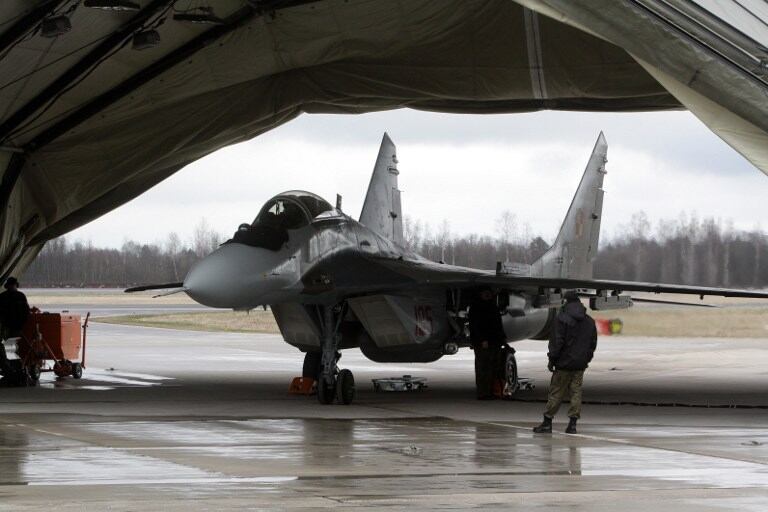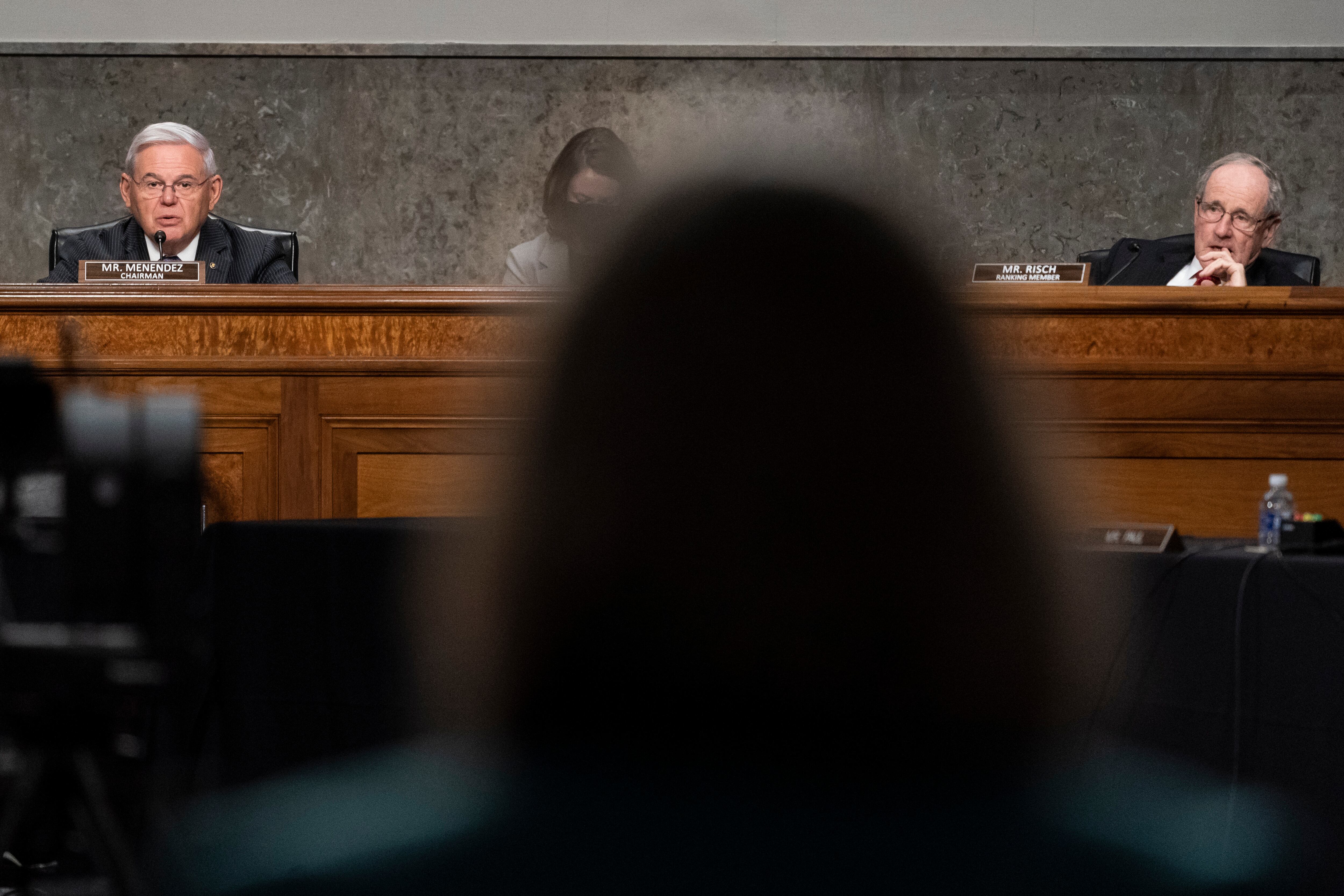WASHINGTON ― Lawmakers on both sides of the aisle grilled Biden administration officials Thursday over the Pentagon’s rejection of Poland’s surprise plan give the United States its MiG-29 fighter jets for use by Ukraine to repel Russia’s mightier forces.
The hearing, in front of the Senate Foreign Relations Committee, let lawmakers vent their anger that Ukraine’s pleas for the aircraft to combat Russia were going unmet. U.S. defense officials have called a potential three-way deal untenable and suggested Ukraine would benefit most from more of the U.S.-supplied weapons it uses effectively every day, including anti-aircraft Stinger and anti-tank Javelin missiles.
“The Ukrainians are getting bombarded, and they do not have ― at least as their country’s leaders suggest and assert ― the wherewithal to compete in the sky,” said Sen. Robert Menendez, D-N.J., the chair of the panel.
“I understand why NATO and the United States are not engaged in a no-fly-zone ― that it has potential direct conflict with Russia ― but I don’t understand why we are not working expeditiously to facilitate planes to Ukraine.”
The Senate’s Republican caucus is unanimously in favor of giving jets to Ukraine, said the panel’s ranking member, Sen. Jim Risch, R-Idaho. He was among lawmakers who criticized the administration as moving too slowly and for second-guessing Ukraine about its own needs.
“We need to help these people, and not tomorrow but today,” Risch said. “This stuff needs to start moving. So I don’t know what juice you have up there to push this thing along, but I’m telling you this is an embarrassment to be here, and be in a position where we can give them something to defend themselves with, and not being able to do it.”
Washington has been looking at a proposal under which Poland would supply Ukraine with its 28 Soviet-era MiG-29s and in turn receive American F-16s to make up for their loss. But the Pentagon ruled out the move, saying that in the face of Russian anti-aircraft systems, it wouldn’t make Ukraine’s forces more effective and that Russia could view the move as escalatory, prompting it to retaliate.
The hearing came a day after Gen. Tod D. Wolters, head of U.S. European Command, released a statement calling the prospect of adding jets to Ukraine’s military, “high-risk and low gain,” adding that they would not “appreciably increase the effectiveness” of Ukraine’s air force.
Russia has declared that supporting Ukraine’s air force would be tantamount to joining the war, and could spur retaliation.
RELATED

Mara Karlin, the assistant secretary of defense for strategy, plans and capabilities, told lawmakers that Ukraine’s mission-capable MiG-29 squadrons are “not playing a massive role” in the conflict, and she emphasized Ukraine’s use of air defenses to contest its airspace. Asked to elaborate at one point, however, she deferred to Ukraine’s own military.
“We are trying to provide them with everything we can that helps them with air defense, and we don’t see significant effectiveness tied to those airplanes specifically,” Karlin told lawmakers, adding later that Ukraine has not been using its MiG-29s “to the extent that one might suggest.”
Karlin fielded several tense rapid-fire questions from Rob Portman, R-Ohio, who asked repeatedly whether the administration’s judgment was superseding the Ukraine military’s. He questioned how the MiG-29s could be seen as both ineffective and escalatory while Javelins and Stingers could be seen as more effective but less escalatory.
“So you’re saying that we would like to send something that’s more effective that should offend Vladimir Putin more than the airplanes, and yet we cannot send the airplanes? What’s the logic behind that,” said Portman, one of Capitol Hill’s vocal advocates for Ukraine.
Sen. Jeanne Shaheen, D-N.H., saw mixed messaging from the administration, which had been advocating for the transfers before it was caught off-guard by the Polish offer.
“There is bipartisan support to provide these planes. It is disappointing to see the reluctance on the part of the administration, and it’s coming across as indecision and bickering among members of the administration,” she said. “If there is a good answer to why we’re not doing this, we all understand that. But we haven’t gotten a good answer to the question.”
Sen. Mike Rounds, R-S.D., and a senior member of the Senate Committee on Armed Services, made a push to learn more about the logistics that seemed too tangled for the administration ― but the answers were not responsive. He asked how the aircraft would be prepared, how the Ukrainian pilots would be trained, where the aircraft could be safely transported to and from and how the aircraft might be armed.
“I am concerned about the actual logistics, the timeframes that we’re talking about to prepare the aircraft to actually be able to be used there and the equipment that would go with it, the weapon systems ... and then protecting those MiG-29s once they get there,” Rounds said. “Does Ukraine have the ground assets to protect those aircraft once they are in Ukraine?”
It was unclear whether it was to avoid airing details about Ukraine’s military capabilities and allied support efforts, or avoid airing more about the public disagreement between NATO members, but Karlin and her fellow witness, the assistant secretary of state for political-military affairs, Jessica Lewis, sidestepped a number of questions about the aircraft swap.
Criticizing Karlin and Lewis for their “non-answers” throughout the hearing, a frustrated Menendez offered the chance for a future classified session to dig into the administration’s reasons for not facilitating aircraft transfers to the Ukrainians.
“If that happens to be that they have dozens of fighter jets that they’re not using, and then we get to the heart of why they’re not using it, then that might be an explanation. If they need some type of logistical support to take the aircraft ... that might be another answer,” he said. “But both of your departments need to give us insight. If that has to be in a classified setting so be it, but ... there has to be an answer. Non-answers to questions are not answers.”
Joe Gould was the senior Pentagon reporter for Defense News, covering the intersection of national security policy, politics and the defense industry. He had previously served as Congress reporter.





